#rené echevarria
Explore tagged Tumblr posts
Text
Idly thinking about the brilliance of TNG's Lower Decks, so please do bear with me for a little while here... The show's seventh season often gets a not entirely unjustified rap as being a piece of filler while various parts of the writer's room were off shepherding the launch of Voyager and the transition to film with Generations, but here at last the season manages to attain the lofty heights of exactly what we expect from the "final season" of a show like this, in a fashion far more satisfying than simple continuity references or closure to running plot threads could ever be.
What I mean is that it demonstrates the inherent perks of the writer's room as a model of television production, something that has kind of been lost in the age of streaming and micro-writer's rooms. There isn't enough space for someone like, say, Brannon Braga with his weird exploration of body horror and/or temporal fuckery, or Ronald D. Moore with his cynical realpolitik.
Lower Decks very much hinges on René Echevarria's proven talents as one of the strongest writers in the TNG stable when it comes to intimate, character-driven pieces. The pitch came from outside the writer's room, but that hints at the real function of the room as a machine, whereby an abstract idea is subjected to a very particular finesse that helps bring out particular facets of a given script.
Ironically, Echevarria's own Star Trek career is another instructive proof-of-concept in this regard. His first script was The Offspring, but it was given an extensive do-over by Michael Piller and Melinda Snodgrass to better fit the aesthetics of the show. And here, his talents have developed far enough that he's effectively put on the other end of the process.
And it works. The script is beautifully constructed, with so many clever bits that invite the audience to become an active participant in the very procedure of watching Star Trek. The Alaska/Canada screw-up from Lavelle and Ben, the decision to cut away from the transport of Joret Dal and only show the hint of a Cardassian uniform, and of course the central set piece of the intercut poker games. (Here, for the visual triumphs, we should also commend director Gabrielle Beaumount.)
The episode derives its power from the audience's understanding that there were 165 episodes before this one, with their own rhythms and cadences. It disrupts it, but ultimately, in Worf's mutual connection with the lower decks personnel at the very end, collapses the narrative back into its familiar form. Of course, like all good narrative collapses, it comes at a cost, namely that of Ensign Sito.
It's brutal, and soul-crushing, to have spent so much time with this character only to have her swept away by the vicissitudes of fate, but it never feels cynical.
(In fact, one of the more bitterly memorable moments in watching the episode with my parents tonight - who had not seen the episode, or at least not recently - was my mother worriedly voicing her suspicions that Sito was not slated for a happy ending, and my father noting how bleak it would be for them to bring back this character to tell such a story. Crucially, he did not say this to disapprove, and I think it speaks volumes to how much Echevarria's script relies on the audience applying the televisual grammar of Star Trek to the episode.)
I'll admit I haven't seen any of the more modern Trek shows beyond Season 2 of Discovery - not out of conscious choice, mind you, I just have only so many hours of the day to watch Star Trek - but I can absolutely understand why this was the episode that got to pretty much single-handedly inspire the concept of an entire show, even if only in spirit.
For a show that can often feel rather formulaic - which isn't a problem, because the formula is a very, very good one that leads to some fantastic episodes - Lower Decks is proof that TNG wasn't *entirely* content to just coast by and rest on its laurels. It would have been justified to do so, but it still threw in the odd stylistic leap here and there.
And in so doing, it inadvertently prefigures more experimental modern television techniques - and contrasting against some of the more frustrating tendencies of the streaming era - all amidst a genuinely heartfelt and moving story. With all due respect to The Pegasus, Parallels and All Good Things, for me I think Lower Decks has now emerged as the champion of Season 7.
It's just that fantastic.
26 notes
·
View notes
Text
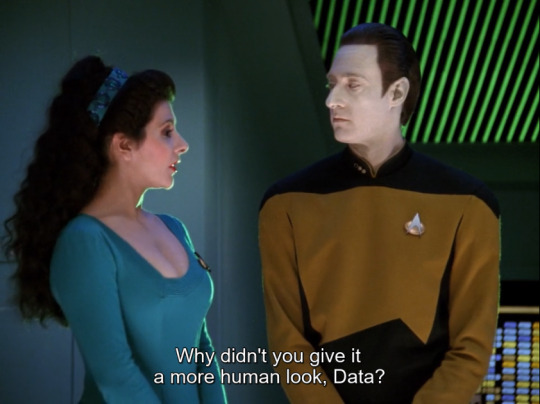
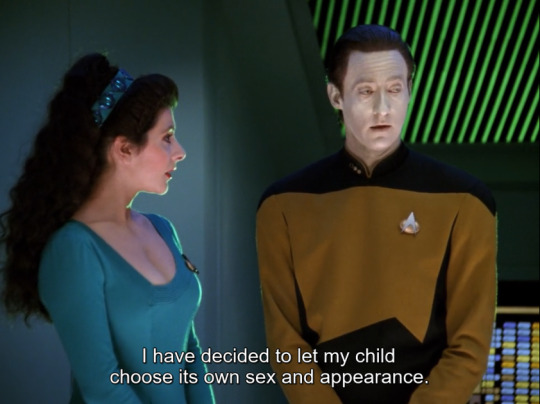
TNG 3x16
#it is for this and many other reasons that data is a patron saint of this site#rené echevarria writing this episode: tumblrinas in thirty years are gonna love this one
74 notes
·
View notes
Text
“Back in the 21st century, however, not everything was rosy. Indeed, the two-part "Star Trek: Deep Space Nine" episode "Past Tense" (January 2 and 9, 1995) threw its main characters back in time — via a transporter accident — to the year 2024 when everything seemed to be at its worst. Earth in 2024 was overrun with poverty, and Captain Sisko (Avery Brooks) had to explain to Dr. Bashir (Alexander Siddig) that housing insecurity had reached epidemic proportions. Indeed, the population of unemployed and unhoused people in major cities had reached such high levels, that the American government had built special "Sanctuary Districts" where the unhoused were rounded up and imprisoned in a ghetto.
The mentally ill weren't treated, and the hungry were fed with a malfunctioning rationing system. It wouldn't be until an activist named Gabriel Bell rose up in protest and led a riot against the police that conditions would change. The Bell Riots were said to be a significant part of Trek's history.
Given the recent news that Governor Gavin Newsom has signed an executive order to sweep the state of unhoused encampments, "Past Tense" — set in 2024 — is beginning to feel weirdly prescient.
Housing insecurity and homelessness, it should be said, is a serious problem in California. Rents are high, and there is little effort made to provide low-cost housing or shelters for the state's many unhoused citizens. At last count, there were over 181,000 unhoused people in the state, 28% of the entire country's unhoused population. Many people live in tents, often set up under freeways or other sheltered areas, and form miniature encampments. There is little sanitation in such encampments, and the quality of life isn't great. Every so often, the police department is called in to sweep these encampments off the streets, forcing the people to move on to another neighborhood. However, they are not taken to shelters but merely told to go elsewhere. They then set up camps under another freeway and the cycle continues.
On July 25, Gavin Newsom signed an order that would only exacerbate the problem, an order stemming from a Supreme Court Decision that allowed states to ban public sleeping at their own discretion. While Newsom has pledged billions of dollars to build shelters, the measure to "sweep the streets" of encampments has been called a wonton and unhelpful measure by critics.
It's a strange coincidence that "Star Trek" should have written a story, back in 1995, about how 2024 will be the year the housing insecurity problem in the United States will boil over. Gavin Newsom has essentially signed a measure that opens the door for the cruel "Sanctuary Districts" seen in "Deep Space Nine." If Newsome is a "DS9" fan, he seems to have taken the wrong lessons from "Past Tense."
(…)
On the DVD commentary track for "Past Tense," the episode's writers — Robert Hewitt Wolfe, Ira Steven Behr, and René Echevarria — said they were inspired by a previous mayor's actions. The Republican Richard Riordan (who was mayor of Los Angeles from 1993 to 2001) suggested in the early 1990s that the city build what he called "havens" for the city's homeless, essentially herding them into tent cities. Riordan said he wanted to keep the streets clear because it was good for local businesses, but he never suggested how these fenced-off "havens" were meant to be run, or how the homeless insides of them were to be helped.
The writers of "Deep Space Nine" were trying to invent a fictional, near-future scenario where the world was too far gone to save. Outside their windows, politicians were merely suggesting it in real life.
While Newsom's new measure doesn't spell out the same kind of "havens" that Riordan suggested, it is uncanny that the new homelessness measures should come tumbling down the pipeline in 2024, when "Past Tense" takes place. We'll have to wait to see if Gabriel Bell is also real. It's starting to feel like it.“
#star trek#deep space nine#deep space 9#star trek ds9#2024#homlessness#homeless#unhoused#california#gavin newsom
46 notes
·
View notes
Text
Star Trek Historical Event HAPPENING THIS YEAR
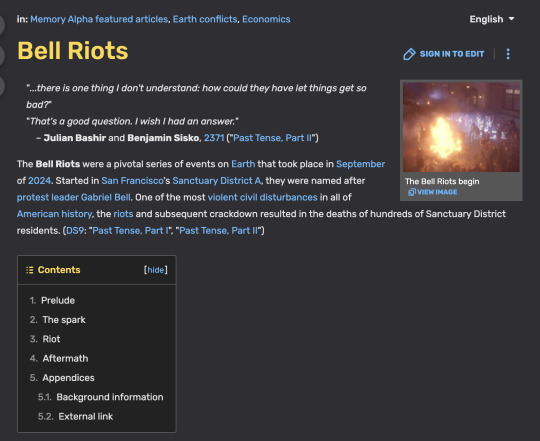
Star Trek predicting the future again?
The conceptualization of the Bell Riots began after Robert Hewitt Wolfe suggested doing a DS9 episode about homelessness. Even though he and Ira Steven Behr tried several ways of doing the story, they were particular about what form the protest against homelessness would take. René Echevarria recalled, "We certainly didn't want to do a Martin Luther King, which would have been an obvious way to go. We didn't want to have Sisko leading a march or a protest." (Captains' Logs Supplemental - The Unauthorized Guide to the New Trek Voyages, p. 89)
Ultimately, the writers based the Bell Riots on two historical incidents, both of which took place in the early 1970s: the Kent State shootings of anti-war protesters in 1970 and the Attica Prison riot in 1971. Whereas the reactions to the former event had had a major impact on Ira Steven Behr, his idea of basing the protest on the Attica Prison riot was also a major influence on the DS9 story itself. Behr stated, "I was driving home one evening, and I suddenly thought, 'Attica.' I came in the next day and told Robert, 'I hope you like it, because I think this is the way we have to do it – we're gonna do concentration camps." (Star Trek: Deep Space Nine Companion (p. 196)) Of the Kent State shootings, Behr remembered, "Once they started shooting down American college students, everyone I knew who was still pro-war said, 'Maybe we should just end this damn thing.' And many of the counterculture kids, ironically, said, 'If they're gonna shoot us, screw the revolution. Let's become accountants.' It had a big impact on me, and I got the idea of doing a combination of Kent State and an Attica [prison]-type siege, starting with the question: What would happen if the government started putting these people in camps? How would society deal with that or rationalize it? How would the homeless people deal with it?" (Captains' Logs Supplemental - The Unauthorized Guide to the New Trek Voyages, pp. 89-90)
5 notes
·
View notes
Text
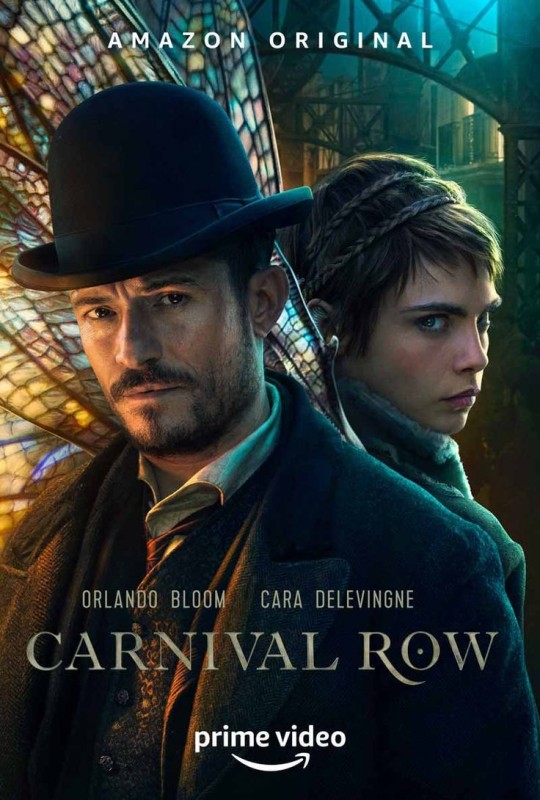
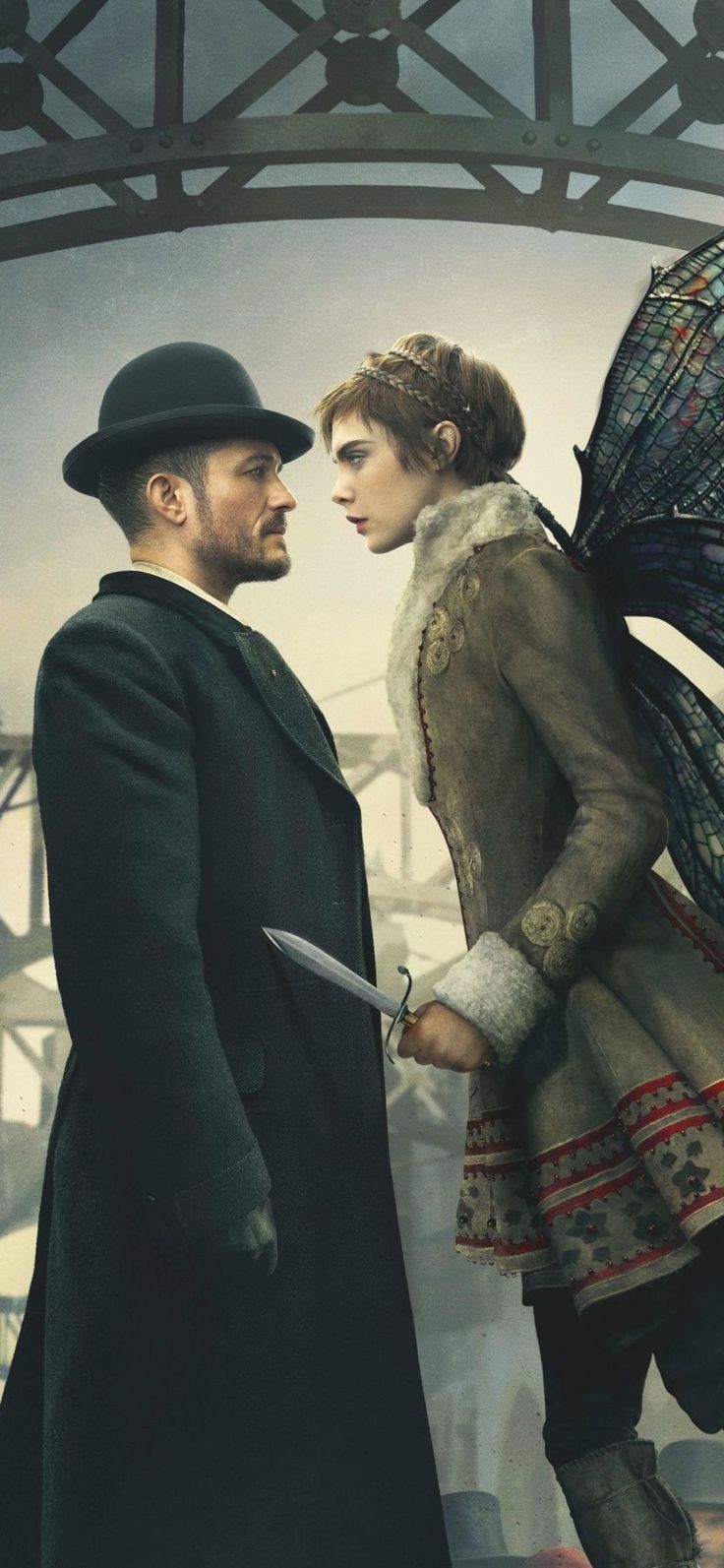

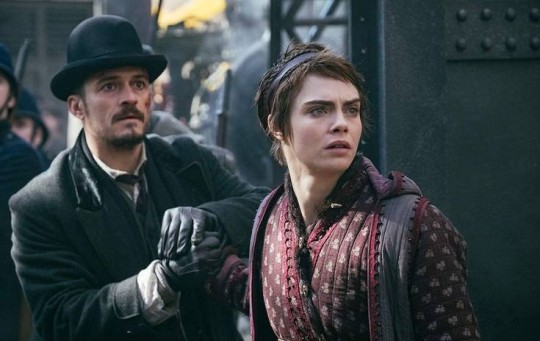
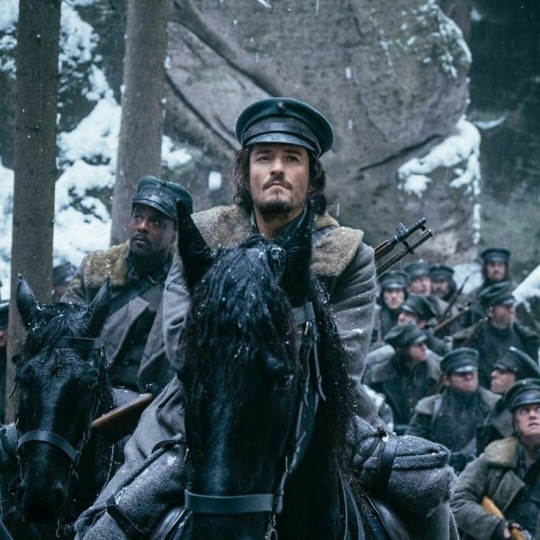
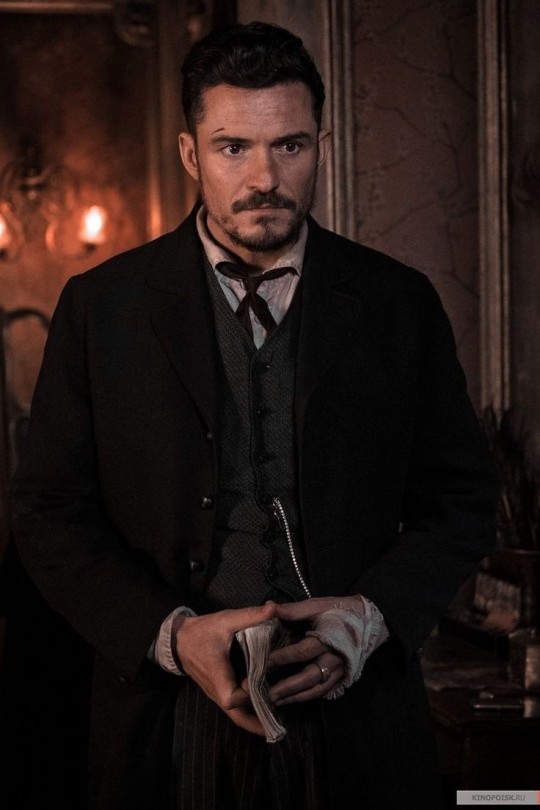
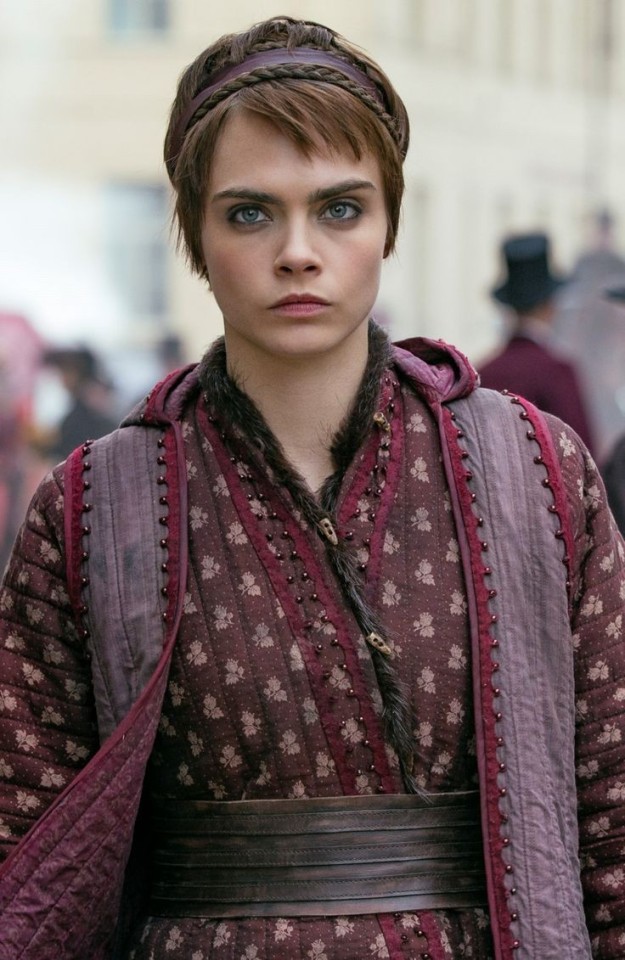
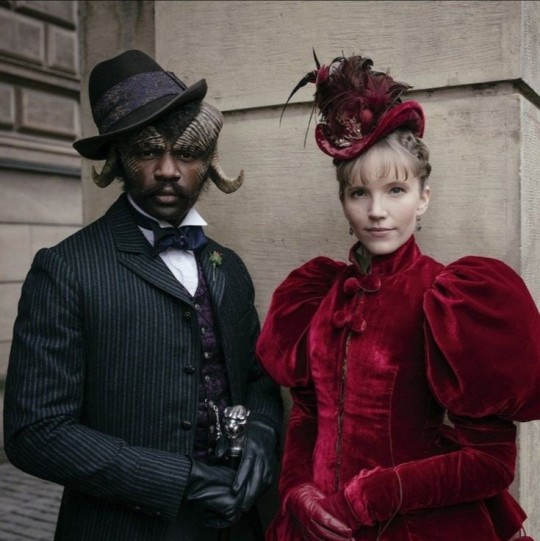
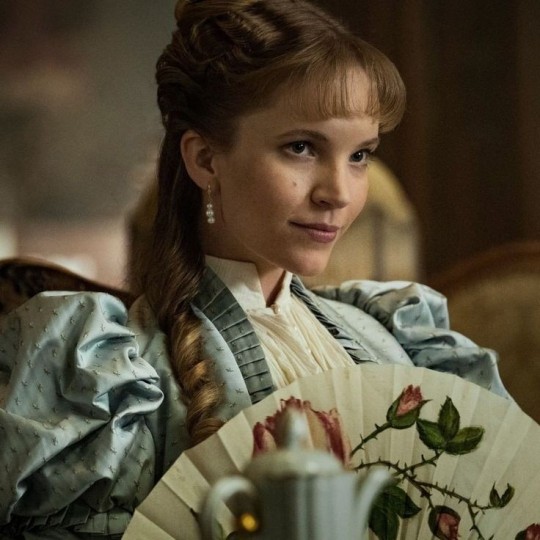
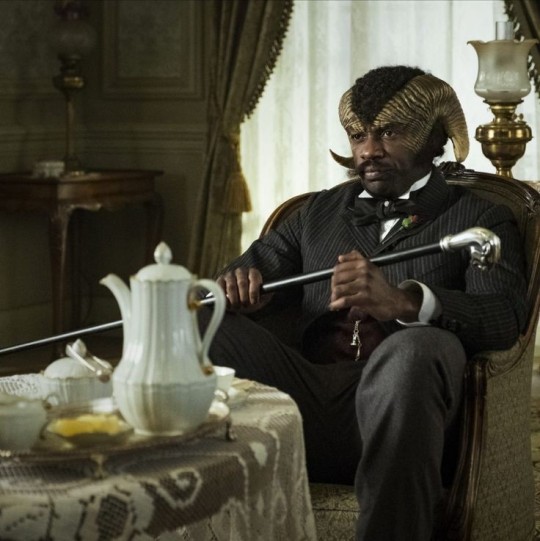
CARNIVAL ROW (2019-2023)
created by travis beacham and rené echevarria
11 notes
·
View notes
Text
“Star Trek: Deep Space Nine” s6e15 (1998)
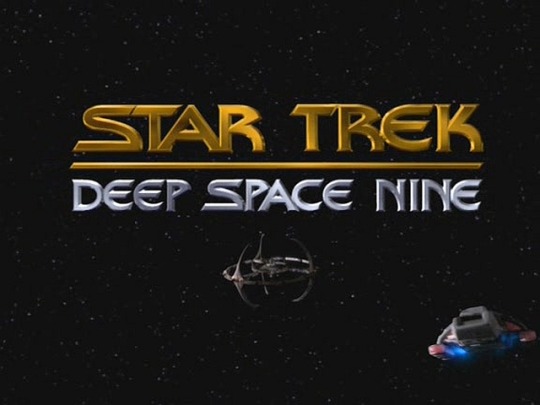
Honor Among Thieves, teleplay by René Echevarria.
DS9 does Wiseguy! With Nick Tate and Colm Meaney, two of my favourite actors, as in the equivalent of the Sonny and Vinnie roles.
For me, it's a terrific take on the idea. No surprises, because we've seen it done on many cop shows before, but it's great to see this story done so well in Star Trek.
My 785th episode of Star Trek, out of 893.
My 690th TV episode of 2023. Averaging 1h57m of TV every day.
9/10
2 notes
·
View notes
Photo


“Carnival Row (Saison 2)” série créée par René Echevarria et Travis Beacham avec Caroline Ford et Arty Froushan dans Orlando Bloom, Cara Delevingne, Karla Crome, Ariyon Bakare, Tamzin Merchant, David Gyasi, Jay Ali, Andrew Gower, Simon McBurney, Jamie Harris, Jared Harris, Waj Ali, Arty Froushan et Alice Krige, mars 2023.
#films#Series#fairies#Echevarria#Beacham#Bloom#Delevingne#Crome#Bakare#Merchant#Gyasi#Ali#Gower#McBurney#Harris#Froushan#Krige
2 notes
·
View notes
Text
Looking at recent Dr Who et al, I think AI's been used for a few years now. It's just that they want a team of human writers to be paid for as well. Clownfish TV monitored one writer's room, who spent all day posting on twitter. They clearly weren't writing. They were sitting about eating expensive treats and drinking designer coffees whilst fiddling with iphones, while an idiot box did all the work for them. At best, they might have polished the scripts up a bit. Maybe selected the best one out of five.
I pointed out back in the writer's strike days that it is routine to have ten writers in a room now. We used to have one, maybe two. That's how we got things like Star Trek. Now it takes a giant team to produce The Acolyte. It's enshittification.
e.g.

Star Trek: The Next Generation (TV Series)
The Inner Light (1992)
Morgan Gendel ... (teleplay by) and Peter Allan Fields ... (teleplay by) Morgan Gendel ... (story by) Brannon Braga ... (staff writer) René Echevarria ... (staff writer)
Not one moment spent on social media.
The City on the Edge of Forever
Writers
Harlan Ellison
Gene Roddenberry
Two writers, Gene basically adapting the Ellison version to make it fit better. Not a single post on social media, not even a selfie. It's amazing how productive writers could be if we could take away their phones.

IMO this was the quintessential Star Trek, to the point that portal would reappear over and over as tributes in assorted media.
"As I'm watching the episodes for reference just before drawing each strip, I take notes on ridiculous stuff that I can make fun of in the comic. Things that pull me out of the story and make me think, 'That makes no sense. I can make a gag about this bit.' For most episodes I have anywhere between 10 lines and half a page of notes. When this episode ended, I had written nothing."
— David Morgan-Mar, creator of Planet of Hats
Even the original story was made into its own comic.


I’m just going to leave this here
77K notes
·
View notes
Text
The begotten was such a heart wrenching epiosde. God damn it all.
Odo's "it's just a baby" at the beginning. That started it all. René Echevarria will be paying for my therapy.
0 notes
Text
Well, I guess if Lower Decks represents a case study of how well-served René Echevarria has been by TNG's writer's room, Journey's End just kind of serves to show that Ronald D. Moore has really reached the point where he would be much better served by writing on Deep Space Nine...
Which fits, I suppose, since this is his penultimate writing credit on the show, with the last one being the literal series finale.
Like, it's surreal to think that the Maquis storyline started on TNG, the show that was arguably least well-suited to this kind of fundamental distrust in Starfleet and the Federation. That is, of course, Deep Space Nine's ballgame - Sisko pun definitely intended - and even though Moore feels like the TNG staff writer most in tune with that ethos, he has yet to make the leap.
This sense that he's fighting an uphill battle against the very character of the show is reinforced from a very early stage, with Picard's attempts to offer up canapés and tea as a peace offering to Admiral Nechayev serving as an effective microcosm of why this kind of story won't work on TNG.
No matter how far Picard gets pushed away from his faith in Starfleet, that faith is too unswerving to ever allow him to make a speech like Sisko's from The Maquis, Part II - the two-parter that is, of course, effectively the direct successor to this story some four weeks later, and does a much better job at handling these themes.
Picard is a great protagonist, and Patrick Stewart does a frankly incredible job selling him as a character who incrementally and almost imperceptibly opens up over the course of the show, to the point where Moore's eventual decision to close on the poker game in All Good Things... has much more weight than it might otherwise, but this is largely a tacit and unspoken evolution in comparison to Sisko's more material growth.
On top of all of this, there is of course the stuff with Wesley and the Traveller which... well, whatever can be said about Where No One Has Gone Before's suggestion that Wesley was an amazing wunderkind, at least it didn't see the need to heap on a weird, appropriative New Age treatment of Native American belief systems and culture a la Dances with Wolves or The Last of the Mohicans.
(Then again, this is all really just hearkening forward to Voyager's woefully ill-advised treatment of Chakotay's heritage as a generic hodge-podge of crude and stereotypical pop cultural depictions of Native Americans, but I'm sure I'll get into that if I ever do a similar write-up like this for a Voyager episode. Maybe Tattoo...)
And don't even get me started on the way the episode just kinda throws in a blood-stained past for the Picard family in such a cursory way that it really just feels like a means of reassuring the audience about their own white guilt...
Anyway, I don't much like Journey's End. Exceedingly controversial take, I know. Maybe some day I'll do some proper reviews of Star Trek episodes, people seemed to like the Lower Decks piece.
(TBH, I mostly just felt a bit guilty over giving so much focus to DS9, so I wanted to get some TNG pieces in before the close of the show. Hope you liked this nonsense, Trek seems to be what most people are here for anyway, but I like talking about it, so I ain't complaining at all.)
#star trek#star trek tng#star trek ds9#maquis#ronald d. moore#jean-luc picard#wesley crusher#chakotay#star trek voy#journey's end#but not the doctor who one
1 note
·
View note
Text
Carnival Row VFX Breakdown By UPP
Carnival Row is an American neo-noir fantasy television series created by René Echevarria and Travis Beacham, based on Beacham’s unproduced film spec script, A Killing on Carnival Row. The series stars Orlando Bloom, Cara Delevingne, Simon McBurney, Tamzin Merchant, David Gyasi, Andrew Gower, Karla Crome, Arty Froushan, Indira Varma, and Jared Harris. The series follows mythological beings who…
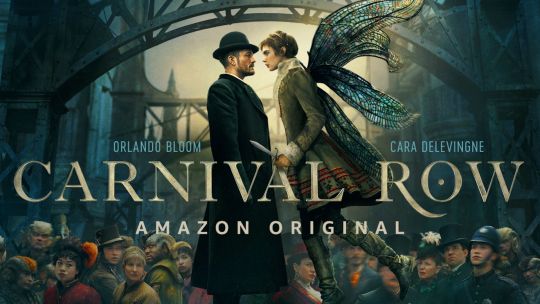
View On WordPress
#before and after#beforeafter#behindthescenes#breakdown#VFX Breakdown#vfx making#visual effects breakdown#visualeffectsbreakdown
0 notes
Photo
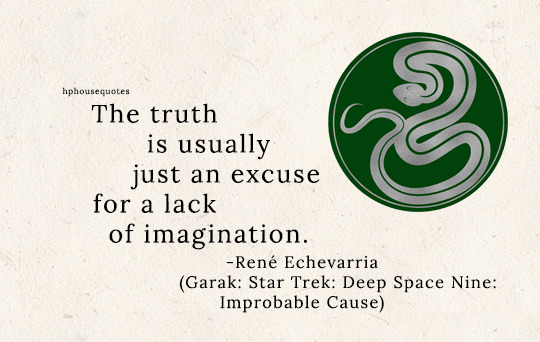
SLYTHERIN: “The truth is usually just an excuse for a lack of imagination.” –René Echevarria (Garak: Star Trek: Deep Space Nine: Improbable Cause)
#harry potter#house quotes#slytherin#star trek#deep space nine#garak#improbable cause#rene echevarria#rené echevarria#hphq
297 notes
·
View notes
Text
Raunch Review: Carnival Row
Raunch Review: Carnival Row
Raunch Reviews is a series about profanity. Not real profanity, but speculative swearing. Authors often try to incorporate original, innovative forms of profanity into our own fantastical works as a way to expand the worlds we build. Sometimes we’re successful. Often we’re not. In this series, I examine the faux-profanity from various works of sci-fi and fantasy, judge their effectiveness, and…

View On WordPress
#amazon#carnival row#fantasy#faux-profanity#language#rené echevarria#slang#speculative fiction#steampunk#travis beacham
1 note
·
View note
Text
“Star Trek: Deep Space Nine” s6e9 (1997)

Statistical Probabilities, teleplay by René Echevarria.
Smart episode gives Bashir a bunch of misfits to work with.
Story morphs effortlessly. First, it's about the plight of these people who are excluded from society/Starfleet. Then, it's about the savants suddenly finding a very important role in the war effort. Finally, it's about an attempt at treason.
Loved how a seemingly stand-alone instalment ended up tied very closely into the ongoing story arc.
Deep Space Nine is now at #3 on my Top 101 Classic TV Shows of 2023 list!
10/10
2 notes
·
View notes
Text
Star Trek: Deep Space Nine s4e6 Rejoined
From Memory Alpha: Steve Oster [one of the producers on DS9] recollected that a man called the show and complained, "You're ruining my kids by making them watch two women kiss like that." It was a production assistant who took the call. After hearing the man's complaint, the PA asked if the man would've been okay with his kids seeing one woman shoot the other. When the man said he would be okay with that, the PA said, "You should reconsider who's messing up your kids." René Echevarria [another of the DS9 producers] said, "My mother was absolutely scandalized by the episode. Shocked and dismayed. She told me 'I can't believe you did that. There should have been a parental guidance warning.'" (Star Trek: Deep Space Nine Companion (p. 279)

Jadzia Dax and Lenora Kahn
13 notes
·
View notes
Photo



“Carnival Row (Saison 2)” série créée par René Echevarria et Travis Beacham avec Caroline Ford et Arty Froushan dans Orlando Bloom, Cara Delevingne, Karla Crome, Ariyon Bakare, Tamzin Merchant, David Gyasi, Jay Ali, Andrew Gower, Simon McBurney, Jamie Harris, Jared Harris, Waj Ali, Arty Froushan et Alice Krige, mars 2023.
#films#fairies#Echevarria#Beacham#Bloom#Delevingne#Crome#Bakare#Merchant#Gyasi#Ali#Gower#McBurney#Harris#Froushan#Krige
0 notes